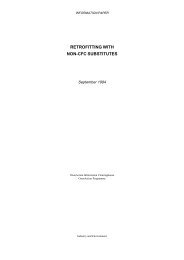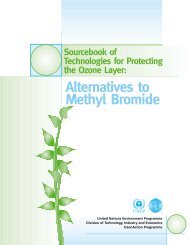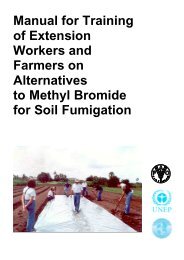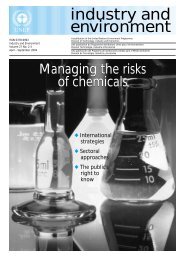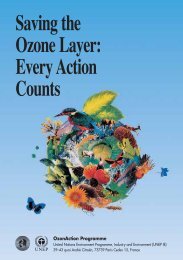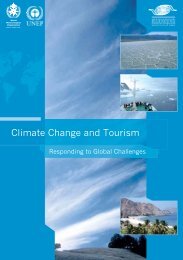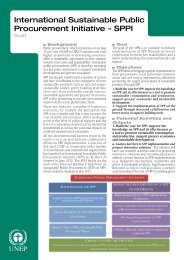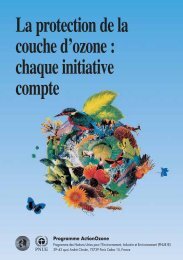Mining and Sustainable Development II - DTIE
Mining and Sustainable Development II - DTIE
Mining and Sustainable Development II - DTIE
Create successful ePaper yourself
Turn your PDF publications into a flip-book with our unique Google optimized e-Paper software.
<strong>Mining</strong><br />
Activities Programme in the Industrial Activities<br />
Branch of the International Labour Organization<br />
(ILO, www.ilo.org) are aimed at ensuring safe<br />
working conditions at mine sites. While the United<br />
Nations <strong>Development</strong> Programme (UNDP)<br />
has no mining programme as such, its national<br />
offices frequently sponsor training, information<br />
<strong>and</strong> environmental assessment activities related to<br />
mining development.<br />
The Baia Mare tailings accident (30 January<br />
2000) resulted in a number of commissions being<br />
formed to consider follow up actions. These<br />
include the European Union (EU) Baia Mare Task<br />
Force, Romanian Government, UNEP <strong>and</strong> the<br />
Office for the Co-ordination of Humanitarian<br />
Affairs (OCHA) Assessment Mission, <strong>and</strong> the US<br />
Environmental Protection Agency (EPA). The<br />
objective of these investigations is to establish the<br />
cause of the accident, assess the damage, propose<br />
actions to remedy the negative impacts, propose<br />
actions to keep the general public fully informed,<br />
<strong>and</strong> to propose actions to prevent future accidents.<br />
In addition, UNIDO has begun a project in Hungary<br />
on Emergency Preparedness <strong>and</strong> Responses<br />
in <strong>Mining</strong> <strong>and</strong> Metallurgical industries. This initiative,<br />
which involves UNEP <strong>and</strong> the Government<br />
of Hungary, will look at application of the<br />
UNEP APELL (Awareness <strong>and</strong> Preparedness for<br />
Emergencies at Local Level) process in Hungary,<br />
especially along the Tisza River.<br />
Since implementing new policies <strong>and</strong> approaches<br />
requires new skills based on up-to-date information,<br />
building such capacity in government <strong>and</strong><br />
industry partners around the world has been an<br />
important activity for UNEP. In October 1999,<br />
the Chamber of Minerals <strong>and</strong> Energy of Western<br />
Australia <strong>and</strong> UNEP jointly organized an international<br />
conference on environmental education in<br />
the minerals <strong>and</strong> energy industries in Australia.<br />
Academics, industry <strong>and</strong> government officials discussed<br />
how environmental issues can be better<br />
incorporated into current <strong>and</strong> future teaching curricula<br />
without detracting from the extensive technical<br />
education that is required.<br />
The United Nations Department of Economic<br />
<strong>and</strong> Social Affairs (UN DESA) <strong>and</strong> UNEP jointly<br />
held a second Berlin Roundtable on <strong>Mining</strong> <strong>and</strong><br />
the Environment in 1999, in collaboration with<br />
the Deutsche Stiftung für internationale Entwicklung<br />
(DSE – German Foundation for International<br />
<strong>Development</strong>). (The Berlin <strong>II</strong> Guidelines<br />
are reproduced in other parts of this publication).<br />
The Australian Government <strong>and</strong> UNEP cohosted<br />
an international regulators workshop in<br />
Environmental Safety in <strong>Mining</strong> in Perth in October<br />
2000, to discuss how to refine their legislative<br />
tools (discussion papers are posted on the MRF<br />
website).<br />
At the regional level, the North American<br />
Commission for Environmental Cooperation<br />
(CEC – www.cec.org) was created in 1993 by<br />
Canada, Mexico <strong>and</strong> the United States under the<br />
North American Agreement in Environmental<br />
Cooperation to address regional environmental<br />
concerns, prevent potential trade <strong>and</strong> environmental<br />
conflicts, <strong>and</strong> to promote the effective<br />
enforcement of environmental law. Related to<br />
minerals <strong>and</strong> metals are its initiatives on sound<br />
management of chemicals <strong>and</strong> the North American<br />
Pollutant Release <strong>and</strong> Transfer Register.<br />
In the late 1990’s, the <strong>Mining</strong> Policy Research<br />
Initiative (MPRI – www.idrc.ca/mpri) was<br />
launched to address some of the concerns raised<br />
from the rapid expansion of mineral exploration<br />
<strong>and</strong> development throughout Latin America <strong>and</strong><br />
the Caribbean (LAC). Based in Montevideo,<br />
Uruguay, MPRI focuses on the impact of mining<br />
on ecosystems <strong>and</strong> human health <strong>and</strong> the regulation<br />
of mining for environmental purposes.<br />
Appropriate research is underway to ensure that<br />
mining is supportive of sustainable development<br />
in LAC.<br />
Industry groups are mostly organized around<br />
national mining associations <strong>and</strong> international<br />
commodity organizations primarily concerned<br />
with trade issues. One group focusing on environmental<br />
issues is the International Council on Metals<br />
<strong>and</strong> the Environment (ICME – www.icme.<br />
com) based in Ottawa, Canada. ICME has worked<br />
with many of the above organizations, especially<br />
UNEP, to review policy issues <strong>and</strong> define practical<br />
procedures for improving the industry’s general<br />
environmental performance. In May 2000, ICME<br />
<strong>and</strong> UNEP jointly organized an international<br />
meeting to start the process of identifying the<br />
issues <strong>and</strong> considerations related to the management<br />
of cyanide in gold mining. ICME <strong>and</strong><br />
UNEP also held an international workshop on<br />
emergency preparedness <strong>and</strong> response in the mining<br />
industry to discuss the application of APELL<br />
(Awareness <strong>and</strong> Preparedness for Emergencies at<br />
Local Level) to installations <strong>and</strong> hazardous materials<br />
transport in the mining sector. In addition,<br />
UNEP is drafting an APELL for the mining industry<br />
h<strong>and</strong>book. A best practice case study book on<br />
water management at mine sites, a joint<br />
UNEP/ICME publication, is also in process.<br />
Although not primarily focused on mining, the<br />
World Business Council on <strong>Sustainable</strong> <strong>Development</strong><br />
(WBCSD) has been promoting more systematic<br />
<strong>and</strong> integrated environmental management<br />
(eco-efficiency) by companies. One specific<br />
initiative is the MMSD (<strong>Mining</strong>, Minerals <strong>and</strong><br />
<strong>Sustainable</strong> <strong>Development</strong> – www.iied.org/mmsd)<br />
as one of a number of projects being supported by<br />
the Global <strong>Mining</strong> Initiative (GMI – www.globalmining.com).<br />
GMI is a bold initiative of more<br />
than 25 CEO’s of major mining companies to<br />
“ensure that the mining, minerals <strong>and</strong> metals<br />
industry is responsive to global needs <strong>and</strong> challenges.”<br />
Another organization making a strong contribution<br />
to the mining <strong>and</strong> environmental discussion<br />
is the International Commission on Large<br />
Dams (ICOLD), which has sponsored numerous<br />
technical publications <strong>and</strong> conferences concerning<br />
tailings dams. ICOLD <strong>and</strong> UNEP jointly<br />
published a 1996 survey of tailings incidents. A<br />
second publication entitled “Tailings Dams: Risk<br />
of Dangerous Occurrences – Lessons learnt from<br />
practical experiences” is expected to be published<br />
in early 2001. Finally, <strong>and</strong> based on recommendations<br />
in the UNEP/OCHA Baia Mare Assessment<br />
Mission Report, a study of contingency<br />
options including structures for tailings dams<br />
incorporating fail-safe features, secondary security<br />
measures, <strong>and</strong> revised siting criteria, especially<br />
when hazardous materials like cyanide are<br />
involved, is under consideration.<br />
A number of national mining associations are<br />
increasingly addressing the environmental agenda<br />
in a pro-active way. As well as organizing regular<br />
workshops <strong>and</strong> seminars on environmental<br />
matters, several associations have developed firm<br />
policies on environmental responsibility that<br />
members are expected to abide by. A number of<br />
institutions of mining <strong>and</strong> metallurgy hold regular<br />
conferences <strong>and</strong> publish information on environmental<br />
issues, generally with a technical<br />
orientation.<br />
Academic <strong>and</strong> research institutes mainly have a<br />
national focus. One exception is MERN – <strong>Mining</strong><br />
<strong>and</strong> Energy Research Network (formally the<br />
<strong>Mining</strong> Environmental Research Network) which<br />
is located within the Corporate Citizenship Unit<br />
at the University of Warwick Business School<br />
(UK). Its research <strong>and</strong> training activities relate to<br />
the social, economic <strong>and</strong> environmental dimensions<br />
of sustainable development across the minerals<br />
<strong>and</strong> energy sectors. The Southern African<br />
<strong>Development</strong> Community (SADC) <strong>Mining</strong> Unit<br />
in Lusaka, Zambia, has a small environmental<br />
unit which undertakes studies <strong>and</strong> seminars in<br />
Southern Africa. A Southern Africa Workshop on<br />
<strong>Sustainable</strong> <strong>Development</strong> <strong>and</strong> the <strong>Mining</strong> <strong>and</strong><br />
Metal Industries was held in November 2000 in<br />
Pretoria, South Africa co-hosted by SADC, the<br />
Namibian Geological Survey, the South African<br />
Department of Minerals <strong>and</strong> Energy, the Chamber<br />
of Mines of South Africa, ICME <strong>and</strong> the<br />
World Bank.<br />
In addition, a number of national institutions<br />
are strongly focused on international work. CEN-<br />
TEK in Sweden, <strong>and</strong> Queens University in Canada,<br />
have programmes for international training.<br />
Many national institutes also undertake consultancy<br />
<strong>and</strong> advisory work in other countries. The<br />
Colorado School of Mines co-published a book<br />
entitled the “<strong>Sustainable</strong> <strong>Development</strong> <strong>and</strong> the<br />
Future of Mineral Investment” as a collaborative<br />
effort of the Institute for Global Resources Policy<br />
<strong>and</strong> Management at Colorado School of Mines<br />
(USA), the Metal <strong>Mining</strong> Agency of Japan <strong>and</strong><br />
UNEP.<br />
A few community groups are active in regard to<br />
mining <strong>and</strong> environment, often publishing information<br />
on recent problems <strong>and</strong> upcoming issues.<br />
These groups include World Wide Fund For<br />
Nature (WWF), The World Conservation<br />
Union-IUCN, Friends of the Earth, Conservation<br />
International, Mineral Policy Centre as well as a<br />
number of more nationally focused bodies in specific<br />
countries (eg. <strong>Mining</strong>Watch Canada). Key<br />
issues relate to indigenous issues, biodiversity,<br />
small-scale <strong>and</strong> artisanal mining.<br />
Finally, many regional development banks <strong>and</strong><br />
bilateral aid agencies in Europe, North America,<br />
Japan <strong>and</strong> Australia have sponsored environmental<br />
programmes in developing countries. These<br />
programmes typically involve a range of training,<br />
technical <strong>and</strong> assessment projects. ◆<br />
UNEP Industry <strong>and</strong> Environment – Special issue 2000 ◆ 9



